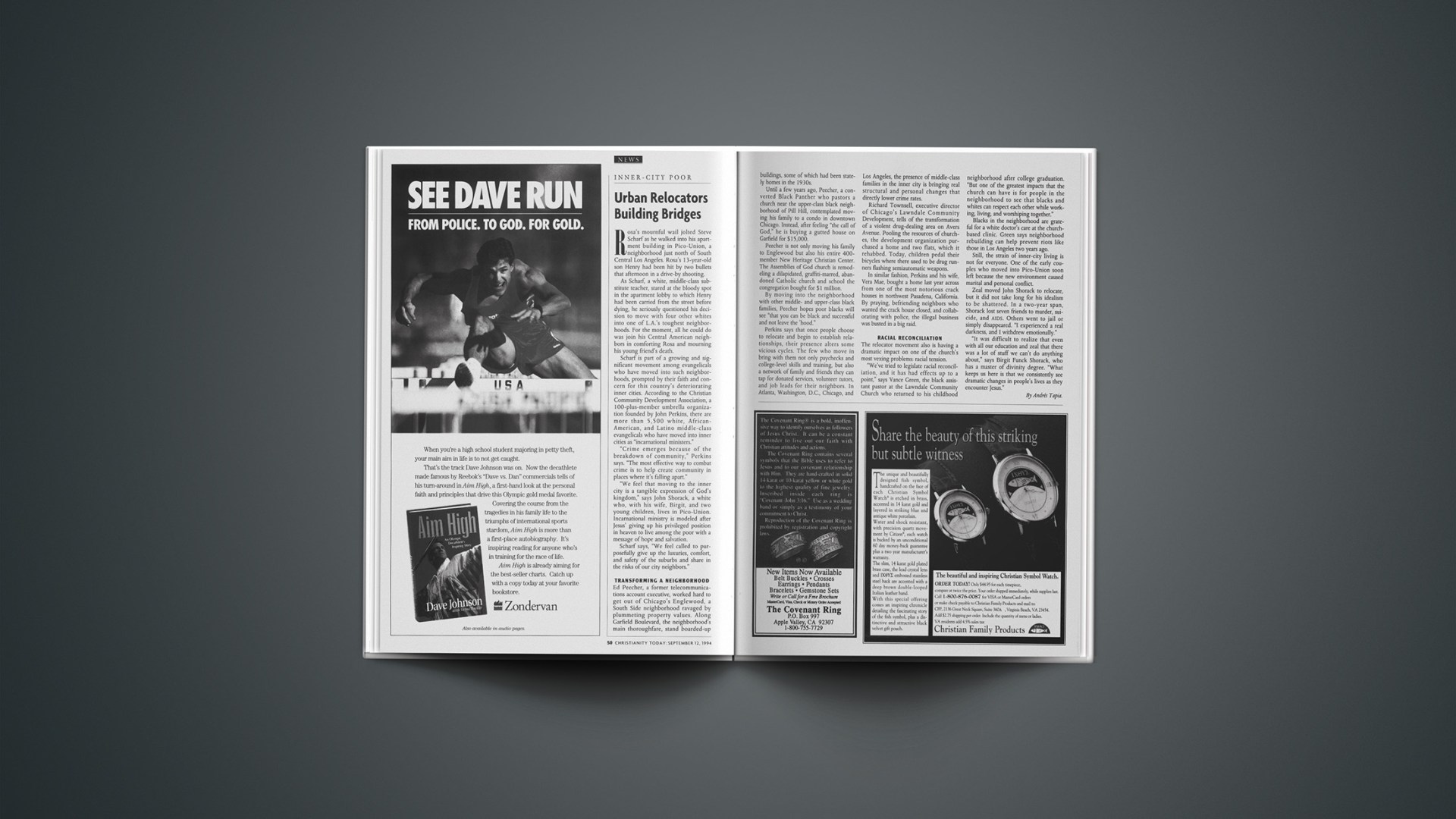Rosa’s mournful wail jolted Steve Scharf as he walked into his apartment building in Pico-Union, a neighborhood just north of South Central Los Angeles. Rosa’s 13-year-old son Henry had been hit by two bullets that afternoon in a drive-by shooting.
As Scharf, a white, middle-class substitute teacher, stared at the bloody spot in the apartment lobby to which Henry had been carried from the street before dying, he seriously questioned his decision to move with four other whites into one of L.A.’s toughest neighborhoods. For the moment, all he could do was join his Central American neighbors in comforting Rosa and mourning his young friend’s death.
Scharf is part of a growing and significant movement among evangelicals who have moved into such neighborhoods, prompted by their faith and concern for this country’s deteriorating inner cities. According to the Christian Community Development Association, a 100-plus-member umbrella organization founded by John Perkins, there are more than 5,500 white, AfricanAmerican, and Latino middle-class evangelicals who have moved into inner cities as “incarnational ministers.”
“Crime emerges because of the breakdown of community,” Perkins says. “The most effective way to combat crime is to help create community in places where it’s falling apart.”
“We feel that moving to the inner city is a tangible expression of God’s kingdom,” says John Shorack, a white who, with his wife, Birgit, and two young children, lives in Pico-Union. Incarnational ministry is modeled after Jesus’ giving up his privileged position in heaven to live among the poor with a message of hope and salvation.
Scharf says, “We feel called to purposefully give up the luxuries, comfort, and safety of the suburbs and share in the risks of our city neighbors.”
TRANSFORMING A NEIGHBORHOOD
Ed Peecher, a former telecommunications account executive, worked hard to get out of Chicago’s Englewood, a South Side neighborhood ravaged by plummeting property values. Along Garfield Boulevard, the neighborhood’s main thoroughfare, stand boarded-up buildings, some of which had been stately homes in the 1930s.
Until a few years ago, Peecher, a converted Black Panther who pastors a church near the upper-class black neighborhood of Pill Hill, contemplated moving his family to a condo in downtown Chicago. Instead, after feeling “the call of God,” he is buying a gutted house on Garfield for $15,000.
Peecher is not only moving his family to Englewood but also his entire 400 member New Heritage Christian Center. The Assemblies of God church is remodeling a dilapidated, graffiti-marred, abandoned Catholic church and school the congregation bought for $1 million.
By moving into the neighborhood with other middle- and upper-class black families, Peecher hopes poor blacks will see “that you can be black and successful and not leave the ‘hood.’ “
Perkins says that once people choose to relocate and begin to establish relationships, their presence alters some vicious cycles. The few who move in bring with them not only paychecks and college-level skills and training, but also a network of family and friends they can tap for donated services, volunteer tutors, and job leads for their neighbors. In Atlanta, Washington, D.C., Chicago, and Los Angeles, the presence of middle-class families in the inner city is bringing real structural and personal changes that directly lower crime rates.
Richard Townsell, executive director of Chicago’s Lawndale Community Development, tells of the transformation of a violent drug-dealing area on Avers Avenue. Pooling the resources of churches, the development organization purchased a home and two flats, which it rehabbed. Today, children pedal their bicycles where there used to be drug runners flashing semiautomatic weapons.
In similar fashion, Perkins and his wife, Vera Mae, bought a home last year across from one of the most notorious crack houses in northwest Pasadena, California. By praying, befriending neighbors who wanted the crack house closed, and collaborating with police, the illegal business was busted in a big raid.
RACIAL RECONCILIATION
The relocator movement also is having a dramatic impact on one of the church’s most vexing problems: racial tension.
“We’ve tried to legislate racial reconciliation, and it has had effects up to a point,” says Vance Green, the black assistant pastor at the Lawndale Community Church who returned to his childhood neighborhood after college graduation. “But one of the greatest impacts that the church can have is for people in the neighborhood to see that blacks and whites can respect each other while working, living, and worshiping together.”
Blacks in the neighborhood are grateful for a white doctor’s care at the church-based clinic. Green says neighborhood rebuilding can help prevent riots like those in Los Angeles two years ago.
Still, the strain of inner-city living is not for everyone. One of the early couples who moved into Pico-Union soon left because the new environment caused marital and personal conflict.
Zeal moved John Shorack to relocate, but it did not take long for his idealism to be shattered. In a two-year span, Shorack lost seven friends to murder, suicide, and AIDS. Others went to jail or simply disappeared. “I experienced a real darkness, and I withdrew emotionally.”
“It was difficult to realize that even with all our education and zeal that there was a lot of stuff we can’t do anything about,” says Birgit Funck Shorack, who has a master of divinity degree. “What keeps us here is that we consistently see dramatic changes in people’s lives as they encounter Jesus.”
Copyright © 1994 Christianity Today. Click for reprint information.










